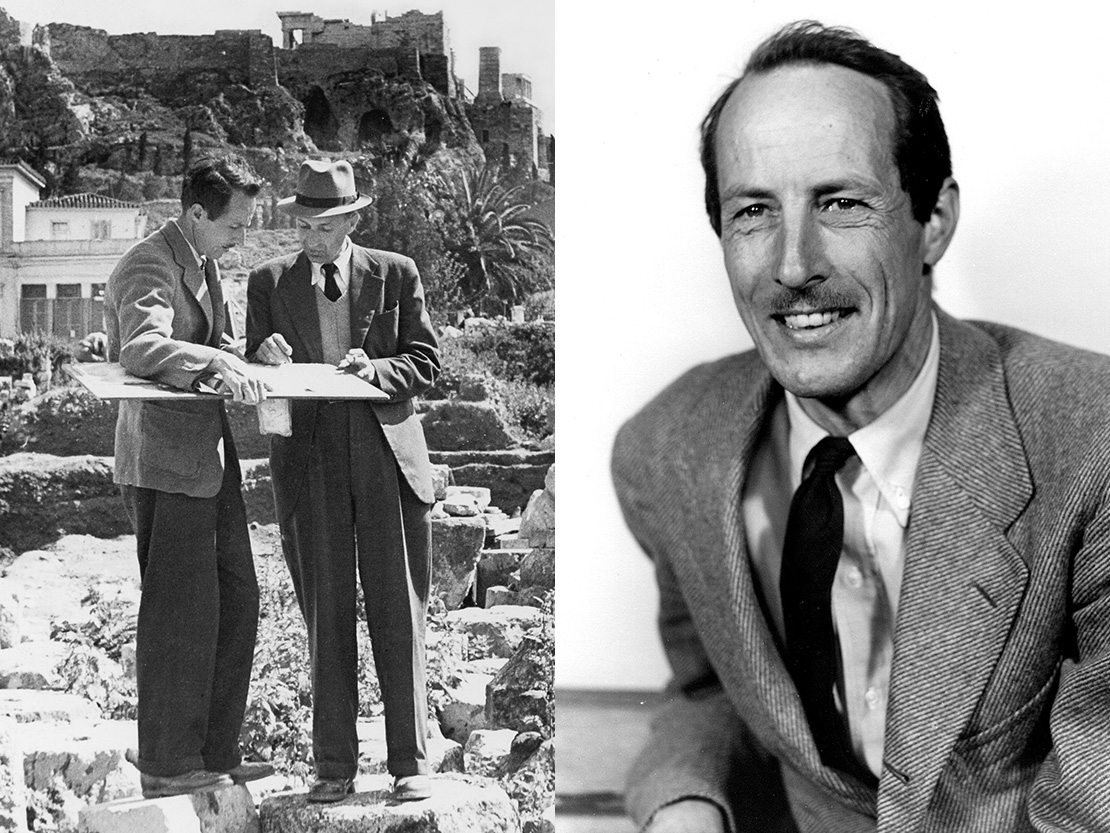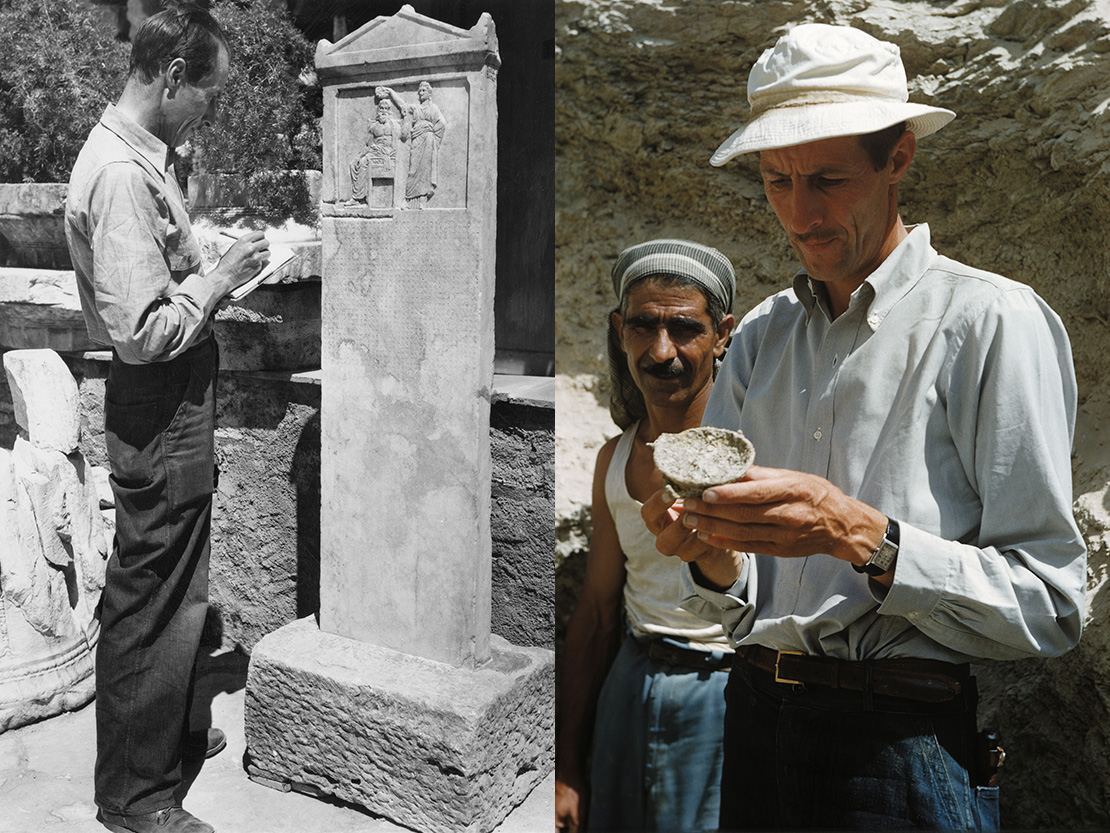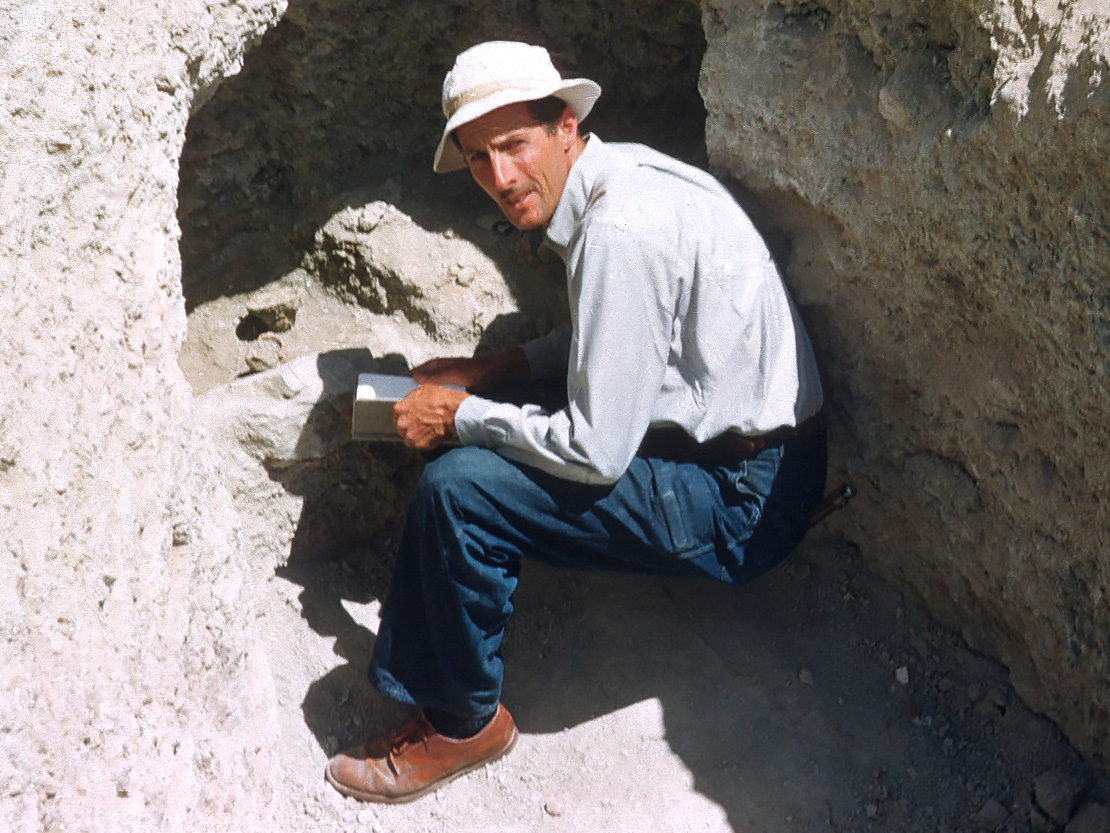
Dining Room in New Student Center Named in Memory of Eugene Vanderpool
The American School of Classical Studies at Athens is pleased to announce a major gift from an anonymous trustee in support of the new Student Center in Athens. This trustee named the Eugene Vanderpool Dining Room in memory of the School’s Professor of Archaeology from 1949 to 1971.
In the early stages of the fundraising campaign to renovate the Student Center, this trustee was among the first to step up, making two contributions of $100,000, which he decided to use to honor Eugene Vanderpool (EV).

Rob Loomis, President of the Board of Trustees, remarked, “This trustee has been one of our biggest supporters, most notably of the Gennadeion West Wing and the Student Center renovation. Although he never expressed any interest in attaching his own name to these projects, he did say that he thought it would be very fitting if individual rooms could be named for prominent scholars of the School’s past. He enthusiastically embraced my suggestion that he name the Loring Hall Dining Room after Eugene Vanderpool, who was the most influential teacher in the history of the School. To him I say ‘Thank you for putting EV front and center!’”

John Camp, Director of the Agora Excavations, offers this poignant tribute to Vanderpool:
Loring Hall has long been both the social and the academic center of the American School. It is appropriate that the memory of Eugene Vanderpool be properly preserved there. Like Loring Hall itself, Vanderpool was, in many ways, the heart of the School for a generation. As the Professor of Archaeology, it fell to him to do the lion’s share of the teaching in the Regular Program, and he affected the lives of hundreds of students in the decades he held the position. A longtime excavator in the Agora, his primary interests were epigraphy and topography, which became the strengths of the School program, especially as they are hard to teach in a classroom. But his real love was all of Greece, in all periods, and this, more than anything, he transmitted and passed on to his students. For 50 years, successive Mellon Professors were directly taught by him (Willy Eliot, Colin Edmonson, Fred Cooper, John Camp, Ron Stroud, and Merle Langdon), or were his grandstudents (John Oakley, Jim Sickinger, Margie Miles, and Kevin Daly). Quiet, unassuming, and private, EV as much as anyone made the School the center of learning it has become.
He had a home and family, and yet one closely associates him with Loring Hall. Almost every single day, he came to tea and was readily accessible to all who wished to engage with him. In particular, this was the occasion when one could learn where our optional Saturdays would be spent. He was working on the topography of the battle of Marathon and the northwest frontier of Attica in the 1970s, and anyone who wanted was welcome to literally tag along almost every weekend. Sometimes there were two of us, sometimes 20. My favorite day was a visit to the Limiko tower overlooking Boiotia on the north side of Mt. Parnes—a true Odyssey, lacking only a ship. This trip consisted of two bus rides, a taxi ride, a teleferique ride to the top of Parnes, a four-hour walk to the tower, a further four-hour walk (some in the dark) to the Boeotian town of Avlona, a 9:00 PM train back to Athens, and one more taxi back to the School.

About Eugene Vanderpool
Below is an excerpt from The History of the American School of Classical Studies at Athens, 1939–1980 by Lucy Shoe Meritt:
EV came to the School first in 1929 as a student just graduated from Princeton University. He returned in 1932 as Athenian Agora Fellow and was Agora Fellow and then Assistant Field Director until 1967 at the same time that he was Professor of Archaeology, occupying in reality two full-time positions of the highest responsibility. As excavator and as Professor at the School Vanderpool's interests and proficiencies lie in many fields; there is no aspect of ancient archaeology and literature and few in the later periods unfamiliar to him, and his publications extend over a wide range, but it is in the fields of Athenian and Attic epigraphy and topography that his greatest contributions have been made, in numerous publications as in teaching and directing others. His guidance and concern for members of the School and their work through a whole generation, his masterly teaching, his wise and firm administration of both the School whenever the Director was in America and the Agora Excavations when the Field Director was not in Athens made him all but indispensable to staff and students alike for information, advice, understanding. There has never been a more beloved member of the School community. Because every student of the School (and "student" here includes every one associated with the School) owes him such an incalculable debt, it was right that their tribute to him should be in the form of a fellowship in his name, held for the first time in 1971–72. It is awarded to a second-year student on recommendation of the Director, and it "will permanently call to mind the ideals of scholarship and teaching he personifies."
About the Student Center Campaign
The Student Center Campaign was launched in October 2018 to raise funds for renovating and expanding the three aging buildings that serve as the intellectual and residential heart of the American School: Loring Hall, the Annex, and West House. This transformative project will increase housing capacity, reduce energy consumption, add state-of-the-art features and technology, and bring the buildings up to the latest technical standards—all while preserving the complex’s historical appearance. The Student Center will remain the place where members of the community gather for meals, tea, ouzo hour, holiday celebrations, and lectures—a source of lifelong professional and personal relationships that characterize the collegial and intellectually vibrant atmosphere of the School. This modernized setting will enhance that experience and will meet the needs of the School community well into the future.
The goal of the Student Center campaign is $9.4 million, inclusive of a maintenance endowment. Thanks to the generosity of supporters like this anonymous trustee, $6.6 million has been raised to date. The new Student Center is expected to open in June 2021.
Support the Campaign
To learn more about how you can support this historic initiative, please contact Nancy Savaides, Director of Stewardship and Engagement, at nsavaides@ascsa.org or 609-454-6810. Naming opportunities for a variety of spaces in the Student Center are still available. Donors can choose from a wide range of gift levels to name a room or area in honor of themselves, an American School scholar, or a family member, friend, or group. Please click the links below to view the nameable spaces and options that remain:
Student Center Construction Photo Gallery
Click this link to view more photographs of the work in progress.
